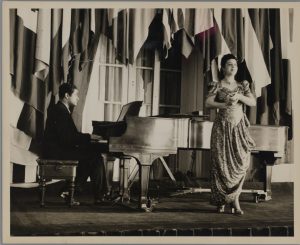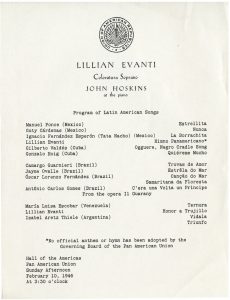Lillian Evanti was a prominent opera singer, and one of the first, if not the first African-American women to tour with a European opera company. Additionally, she was a founding member of the National Negro Opera Company, performing as Violetta in their performance of Verdi’s La Traviata. As a famous performer, Evanti gave concerts and recitals all over the United States and Western Europe. One such performance was at the Hall of Americas in the Pan-American Union, celebrating many Latin American composers.

Lillian Evanti with John Hoskins at the Pan-American Union.
Robert H. McNeil, Lillian Evanti and John Hoskins perform at the Hall of the Americas Pan American Union, 1946, Anacostia Community Museum Archives, Box 26, Folder 54.
Evanti’s program included works from Mexican, Cuban, Argentinian, and Venzuelan composers (both women and men), an aria from Il Guarany, an opera composed by Antônio Carlos Gomes, as well as a few of her own original compositions. Her performance of a diverse range of composers shows that she uplifts silenced and underrepresented voices. Her contribution of original compositions for this occasion, “Himno Panamericano,” and “Honor a Trujillo,” not only shows musical virtuosity, but also a willing spirit to participate in diplomacy and international relations.

Recital program, detailing the composers and pieces she performed, including her originals.
Program featuring Lillian Evanti and John Hoskins, Union of American Republics, 1946, Anacostia Community Museum Archives, Box 32 Folder 29.
While researching Lillian Evanti, both for this blog post and for my group mapping project, I found myself confused and frustrated at the fact that recordings of Lillian Evanti singing either do not exist, or are extremely hard to come by. It made me wonder why such a prominent and successful singer was not documented in this way. In just a few simple google searches, I found recordings from two other female opera singers who were contemporaries of Lillian Evanti. So why are there no recordings of Evanti even though her contemporaries received this kind of documentation and legacy? Of course, I cannot say the true answer because I do not know. But I can only speculate as to why Evanti’s legacy lives on in pictures rather than audio. Even if she was a famous performer and traveled the world giving performances, the fact still remains that she was African-American. Her success was revolutionary and a great step towards diversifying the Western canon, but unfortunately her identity as a member of a marginalized community may have contributed to her lack of existent audio recordings compared to her contemporaries. While you might not immediately think about the repercussions of something that happened 80-100 years ago, this proves that the effects of racism and inequity are still felt today, as now we cannot truly discover the legacy of Lillian Evanti. We can read reviews of so many concerts, recitals, and other performances telling us how beautiful and lyrical her voice was, but as far as I know, we will never be able to hear her voice and understand part of why she was so successful.
Citations included in photo captions.
